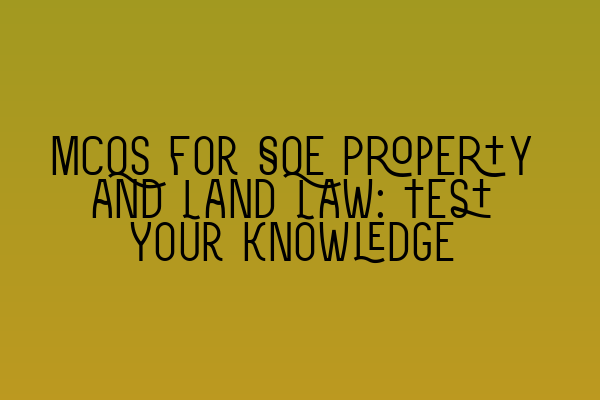MCQs for SQE Property and Land Law: Test Your Knowledge
Welcome to our MCQs for SQE Property and Land Law blog post! Whether you’re studying for the Solicitors Qualifying Examination (SQE) or simply looking to test your knowledge in property and land law, this post is designed to challenge you with some multiple-choice questions.
At SQE Property Law & Land Law, we understand that interactive learning is crucial to understanding the intricacies of property and land law. That’s why we have created this comprehensive set of multiple-choice questions to help you gauge your understanding and identify areas that may require further study.
Before we begin, make sure to check out our related articles:
- Understanding Contractual Capacity: Rights and Limitations
- Interactive SQE Mock Tests for Contract Law: Test Your Knowledge
- Join Our SQE Contract Law Webinars: Expert Insights and Guidance
- Contract Law Reforms: An Analysis of Recent Changes
- Parties in a Contract: Rights and Responsibilities
Question 1:
Which of the following is an essential element for the creation of a valid contract for the sale of land?
- The contract must be in writing and signed by both parties.
- An offer and acceptance must be clearly communicated.
- The contract must be executed as a deed.
- Consideration must be exchanged between the parties.
Answer: The correct answer is a. The contract for the sale of land must be in writing and signed by both parties in order to be valid.
Question 2:
Which of the following rights is not included in the bundle of rights associated with ownership of real property?
- The right to sell or transfer the property.
- The right to exclude others from the property.
- The right to mortgage the property.
- The right to receive compensation for the property if taken by the government through eminent domain.
Answer: The correct answer is d. The right to receive compensation for the property if taken by the government through eminent domain is not included in the bundle of rights associated with ownership of real property.
Now that we’ve covered two sample questions, let’s dive into more challenging MCQs to test your knowledge further.
Question 3:
Which of the following is true regarding fixtures in property law?
- Fixtures can never be removed from a property.
- Fixtures become part of the real property and cannot be removed without causing damage to the property.
- Fixtures are considered personal property and can be freely removed by the owner.
- Fixtures are only relevant in commercial property transactions, not residential transactions.
Answer: The correct answer is b. Fixtures become part of the real property and cannot be removed without causing damage to the property.
Question 4:
Which of the following is not a recognized form of co-ownership of real property?
- Tenancy in common.
- Joint tenancy with right of survivorship.
- Community property.
- Shared tenancy.
Answer: The correct answer is d. Shared tenancy is not a recognized form of co-ownership of real property.
Now that you’ve had a taste of our MCQs for SQE Property and Land Law, why not explore our related articles to further enhance your knowledge:
- Understanding Contractual Capacity: Rights and Limitations
- Interactive SQE Mock Tests for Contract Law: Test Your Knowledge
- Join Our SQE Contract Law Webinars: Expert Insights and Guidance
- Contract Law Reforms: An Analysis of Recent Changes
- Parties in a Contract: Rights and Responsibilities
We hope you found this MCQs post helpful in testing your knowledge and understanding of property and land law. For more resources and expert guidance, feel free to contact SQE Property Law & Land Law, your trusted source for SQE preparation.
